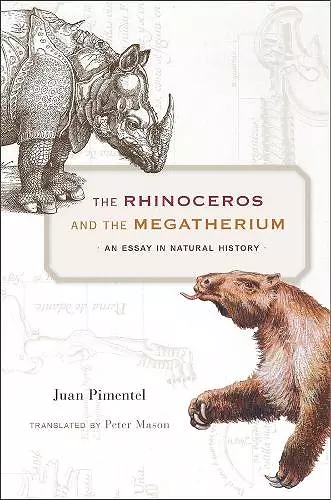The Rhinoceros and the Megatherium
An Essay in Natural History
Juan Pimentel author Peter Mason translator
Format:Hardback
Publisher:Harvard University Press
Published:26th Jan '17
Should be back in stock very soon

One animal left India in 1515, caged in the hold of a Portuguese ship, and sailed around Africa to Lisbon—the first of its species to see Europe for more than a thousand years. The other crossed the Atlantic from South America to Madrid in 1789, its huge fossilized bones packed in crates, its species unknown. How did Europeans three centuries apart respond to these two mysterious beasts—a rhinoceros, known only from ancient texts, and a nameless monster? As Juan Pimentel explains, the reactions reflect deep intellectual changes but also the enduring power of image and imagination to shape our understanding of the natural world.
We know the rhinoceros today as “Dürer’s Rhinoceros,” after the German artist’s iconic woodcut. His portrait was inaccurate—Dürer never saw the beast and relied on conjecture, aided by a sketch from Lisbon. But the influence of his extraordinary work reflected a steady move away from ancient authority to the dissemination in print of new ideas and images. By the time the megatherium arrived in Spain, that movement had transformed science. When published drawings found their way to Paris, the great zoologist Georges Cuvier correctly deduced that the massive bones must have belonged to an extinct giant sloth. It was a pivotal moment in the discovery of the prehistoric world.
The Rhinoceros and the Megatherium offers a penetrating account of two remarkable episodes in the cultural history of science and is itself a vivid example of the scientific imagination at work.
Sophisticated and provocative, this is an outstanding study of the possible ways of interpreting unknown beings through an examination of their multifaceted and presumed pasts, shedding light on the changing understanding of scientific forms over 300 years. -- Stéphane Van Damme, European University Institute
In a series of brilliantly illuminating juxtapositions, between Renaissance and Revolution, between the worlds of the East and West Indies, and, above all, between the enterprises of analysis and description, Pimentel’s astute book shows how the work of imagination and of ingenious imagery has long played a decisive if neglected role in making natural knowledge. -- Simon Schaffer, University of Cambridge
Pimentel’s inspired pairing limns how image and imagination shape our understanding of nature. -- Barbara Kiser * Nature *
[A] fascinating book…Pimentel rather brilliantly describes his book as a ‘historical essay with a tentative and slightly provocative character’ (for which praise must be shared with Peter Mason, for his excellent translation). And if that isn’t a wonderfully tempting hook for the reader, then what is? The Rhinoceros and the Megatherium is part detective story reconstructing the scientific process, and part historical study of how people reacted to the hitherto unknown and unusual. The parallels drawn by Pimentel are beautifully constructed and drip from the page like honey: a section describing the sea voyages of the fossils mirroring the political and intellectual shifts of the periods is especially effective…He has adeptly and eloquently brought back to life not only these two much-marvelled-at beasts but the minds of the people who sought to explain them and the worlds in which they lived. -- Simon Underdown * Times Higher Education *
A dazzlingly strange and resolutely readable dual biography…The Rhinoceros and the Megatherium becomes as much an interrogation of history and science as it is a chronicle of these two animals’ stories. -- Colin Dickey * Los Angeles Review of Books *
Pimentel is an agile and amiable companion through his rich materials…Each half of Juan Pimentel’s fantastic binomial rewards reading in its own right. -- Lorraine Daston * Times Literary Supplement *
For the student of history, this will be a valuable contribution. -- J. E. Grinnell * Choice *
One of the strengths of [Pimentel’s] book is the attention it gives to the relationship between imagination and images—pictures of things seen and then made available to those who have not seen. -- Steven Shapin * London Review of Books *
ISBN: 9780674737129
Dimensions: 210mm x 140mm x 28mm
Weight: 562g
368 pages